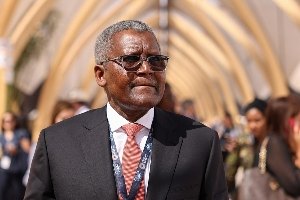Africa’s richest man, Aliko Dangote, has accused some staff members of the Nigerian National Petroleum Company (NNPC) Limited and oil traders of operating a blending plant in Malta that produces substandard petroleum products.
Dangote made this statement over the weekend when he received the leadership of the House led by Speaker Tajudeen Abbas and his deputy Benjamin Kalu.
Dangote asserted that the products from the Dangote Refinery are of far superior quality compared to the ones imported by marketers. He highlighted that the poor-quality fuel imported into Nigeria has caused significant damage to many vehicles. “I still stand by what I said. Go to filling stations, you can check the quality. That is the only way,” he emphasized.
In response to allegations that the Dangote Refinery produces substandard products, Dangote called for an investigation by the House of Representatives into the quality of diesel and petrol sold at filling stations across the country.
He stressed that his refinery, located at the Lekki Free Trade Zone, has been producing high-quality petroleum products.
Dangote also addressed claims that his group of companies enjoys a monopoly in the industry. He rejected these accusations, stating that the Dangote Group adds value by using local raw materials to produce products for the market.
He emphasized that his operations have never blocked others from engaging in the same business.
“If you look at all our operations at Dangote (Group), we add value; we take local raw materials and turn them into products, and we sell. We have never consciously or unconsciously stopped anybody from doing the same business that we are doing,” he said.
Dangote added that when his company entered the cement production industry, Lafarge was the only other operator in Nigeria, and no one accused Lafarge of being a monopoly.
He argued that a monopoly is characterized by using legal means to block competitors, which his group has never done.
“Monopoly is when you stop people, you block them through legal means. No, it is a level playing field whereby whatever Dangote was given in cement, for example, other people were given because some of them even got more than us,” he explained.
Nigeria faces significant energy challenges, with all state-owned refineries currently non-operational and a heavy reliance on imported refined petroleum products.
This reliance has led to fuel queues and tripled petrol prices since the subsidy removal in May 2023, exacerbating the difficulties faced by citizens who rely on petrol for their vehicles and generators.
Last December, Dangote began operations at his $20 billion refinery in Lagos, with an initial capacity of 350,000 barrels per day, aiming to reach 650,000 barrels per day by the end of the year. The refinery has started supplying diesel and aviation fuel to marketers, with petrol supply expected to commence in August.

